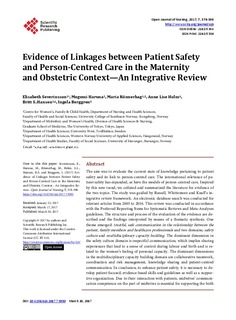| dc.contributor.author | Severinsson, Elisabeth | |
| dc.contributor.author | Haruna, Megumi | |
| dc.contributor.author | Rönnerhag, Maria | |
| dc.contributor.author | Holm, Anne Lise | |
| dc.contributor.author | Hansen, Britt Sætre | |
| dc.contributor.author | Berggren, Ingela | |
| dc.date.accessioned | 2017-07-04T06:23:28Z | |
| dc.date.available | 2017-07-04T06:23:28Z | |
| dc.date.created | 2017-02-10T14:11:33Z | |
| dc.date.issued | 2017 | |
| dc.identifier.citation | Open Journal of Nursing. 2017, 7 (2), 378-398. | nb_NO |
| dc.identifier.issn | 2162-5344 | |
| dc.identifier.uri | http://hdl.handle.net/11250/2447651 | |
| dc.description.abstract | The aim was to evaluate the current state of knowledge pertaining to patient safety and its link to person-centred care. The international relevance of patient safety has expanded, as have the models of person-centred care. Inspired by this new trend, we collated and summarized the literature for evidence of the two topics. The study was guided by Russell, Whittemore and Knafl’s integrative review framework. An electronic database search was conducted for relevant articles from 2005 to 2016. This review was conducted in accordance with the Preferred Reporting Items for Systematic Reviews and Meta-Analyses guidelines. The structure and process of the evaluation of the evidence are described and the findings interpreted by means of a thematic synthesis. One theme emerged: trustful,safe communication in the relationship between the patient, family members and healthcare professionals and two domains; safety culture and multidisciplinary capacity building . The dominant dimension in the safety culture domain is respectful communication, which implies sharing experiences that lead to a sense of control during labour and birth and is related to the women’s feeling of personal capacity. The dominant dimensions in the multidisciplinary capacity building domain are collaborative teamwork, coordination and risk management, knowledge sharing and patient-centred communication. In conclusion, to enhance patient safety, it is necessary to develop patient-focused, evidence-based skills and guidelines as well as a supportive organization. Due to their interaction with patients, midwives’ communication competence on the part of midwives is essential for supporting the birth and fulfilling the women’s needs and expectations. | nb_NO |
| dc.language.iso | eng | nb_NO |
| dc.rights | Navngivelse 4.0 Internasjonal | * |
| dc.rights.uri | http://creativecommons.org/licenses/by/4.0/deed.no | * |
| dc.subject | Communication | nb_NO |
| dc.subject | Integrative Review | nb_NO |
| dc.subject | Midwifery | nb_NO |
| dc.subject | Nursing | nb_NO |
| dc.subject | Patient Safety | nb_NO |
| dc.subject | Person - Centred Care | nb_NO |
| dc.subject | Maternity | nb_NO |
| dc.subject | Obstetric Care | nb_NO |
| dc.title | Evidence of linkages between patient safety and person-centred care in the maternity and obstetric context- An integrative review | nb_NO |
| dc.type | Journal article | nb_NO |
| dc.type | Peer reviewed | nb_NO |
| dc.source.pagenumber | 378-398 | nb_NO |
| dc.source.volume | 7 | nb_NO |
| dc.source.journal | Open Journal of Nursing | nb_NO |
| dc.source.issue | 2 | nb_NO |
| dc.identifier.doi | https://doi.org/10.4236/ojn.2017.73030 | |
| dc.identifier.cristin | 1449364 | |
| cristin.unitcode | 222,90,4,0 | |
| cristin.unitname | Institutt for sykepleievitenskap - Vestfold | |
| cristin.ispublished | true | |
| cristin.fulltext | original | |
| cristin.qualitycode | 1 | |

